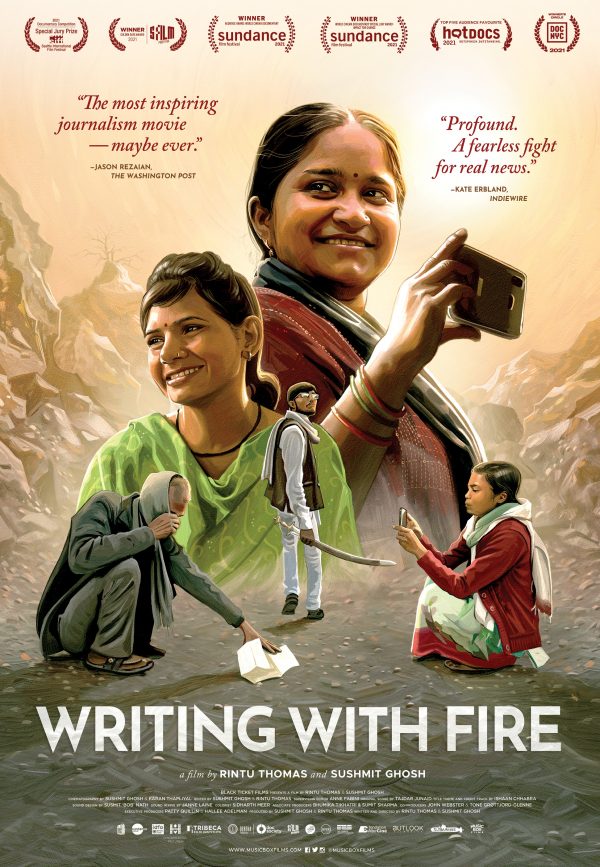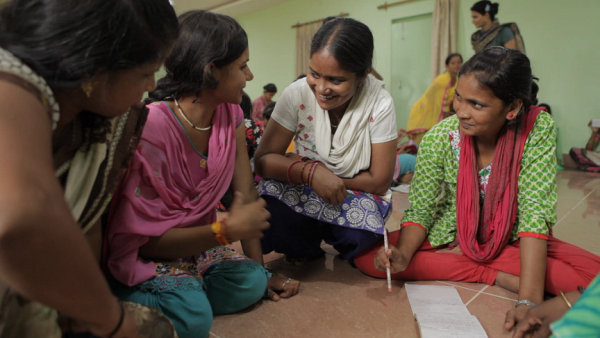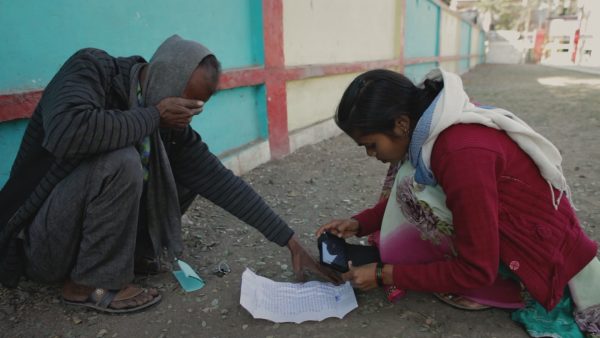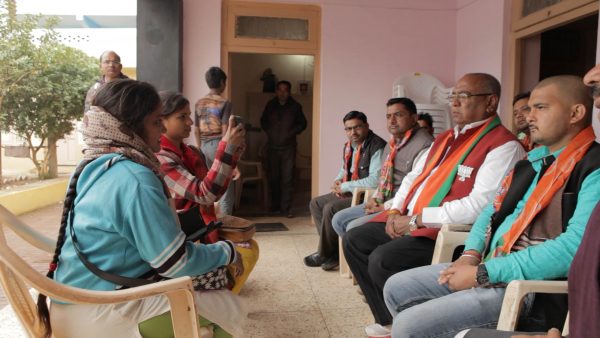
“Writing with Fire” (2021). Cast: Meera Devi, Shyamkali Devi, Suneeta Prajapati. Directors: Sushmit Ghosh and Rintu Thomas. Web site. Trailer.
Getting the truth into circulation when the deck is stacked against you is quite a challenge. In an age when corporate media have come to dominate the journalism landscape, it’s difficult to make inroads for organizations that don’t have ample resources or that don’t fit the expected mold. But, with determination, confidence and a staunch desire to succeed at delivering the truth, it may be possible to achieve a significant breakthrough, as depicted in the new Oscar-nominated Indian documentary, “Writing with Fire.”
Set in Uttar Pradesh, India’s most populous state, “Writing with Fire” profiles Khabar Lahariya (KL)(“Waves of News”), an independent news organization launched by a group of aspiring journalists in 2002. What distinguishes KL is the fact that it’s run entirely by women who come from the Dalit caste, often referred to as “the untouchables.” And, as a region that has many “media dark” areas, it’s often difficult for news to become disseminated to uninformed masses. What’s more, as a region known for its widespread corruption, its tolerance of violence and discrimination against women, and its strict adherence to maintenance of India’s rigid caste system, many Uttar Pradesh locals have trouble learning about what’s unfolding in their area. With conditions like these and a dearth of educational opportunities, it’s easy to keep the populace in the dark – just what those in officialdom want.
In telling KL’s story, filmmakers Sushmit Ghosh and Rintu Thomas enter the picture 15 years after the organization’s founding at a time when it was transitioning from a print outlet to an electronic news source to more widely disperse its output. With its team of 28 semi-literate reporters, the news staff was having to learn how to use a new technology (cell phones), a challenge given that many of them don’t understand the English operating instructions and don’t even have electricity in their homes. However, considering how far the team of journalists had come from their humble beginnings (and in the face of an array of challenges), they forged ahead with this change with the same degree of commitment and dedication that had gotten them to this point.

And what a level of success KL had attained. In a media world dominated by moneyed corporations and men with impressive educational pedigrees, the team of comparative amateurs diligently moved forward in making a name for themselves. What began as a venture that many believed was destined to fail, the organization has blossomed into a widely followed media outlet, with over 150 million viewers of its YouTube channel. The journalists have also demonstrated their perseverance in chasing down their stories, frequently at significant personal risk, both as women specifically targeted because of their gender and in having to obtain information from seedy, unreliable and dangerous sources. In carrying out this task, the women of KL have tracked down stories related to such topics as victimization against women, illegal mining, mob activity, corrupt and negligent government practices, insufficient infrastructure planning and programs, and the rise of right-wing political fundamentalist movements. At the same time, by drawing attention to these matters, KL has often helped to spread awareness of these issues and even spur on much-needed reforms.
KL’s story is personalized by focusing on three of its staff members. Chief among them is 32-year-old Meera Devi, the organization’s tireless principal reporter, who fought against relentless discrimination and a conservative culture to study journalism and become a professional practitioner. Meera’s feisty 20-year-old protégé, Suneeta Prajapati, who grew up as a child laborer in an illegal mine, has emerged as the only female crime reporter in the region, focusing much of her investigative efforts on the region’s lucrative illegal mining businesses and the corrupt nexus between the mafia and politicians. Then there are novices like Shyamkali Devi, who is learning the ropes while on the job, but it’s an undertaking that doesn’t deter her, carrying on despite the challenges to get the story out.

The personal side of this story also delves into the impact that this work has on the reporters when they’re off the clock (if such a thing actually exists for them). Their dedication has had an influence on their home lives, as Meera’s family members make clear. It has also prompted hard choices, such as those faced by Suneeta, who is conflicted about remaining devoted to her professional commitments and living up to the traditional marriage obligations expected of her. But, given their obvious love of this work, it’s hard to imagine any of these journalists walking away from their vocation, especially given how far they’ve come.
Considering the success KL has achieved, it’s positioned to become a major news source in India at large, not just in Uttar Pradesh. Having risen from a local to a regional media outlet, KL is now poised to become a national player. It has even begun to be recognized outside of India, a reputation that’s likely to grow with the release of this film. That could prove to be especially important in light of the changing sociopolitical environment within India, a nation that’s seeing the rise of religious authoritarianism and the impact it’s having on the country’s secular life. With comparable movements taking place in other nations around the world, KL’s coverage of this phenomenon within its homeland could play an important role in keeping citizens elsewhere informed about this potentially significant (and growing) global development.
In the meantime, as this documentary illustrates, the Dalit women of KL can take a well-deserved bow for what they’ve accomplished. In an age when journalism has become increasingly suspect, unreliable and untrustworthy, it’s comforting to know that there are still committed media organizations out there devoted to reporting with honesty, integrity and a burning desire to uncover the truth. And it’s heartening to see that some of the most important work in this area is coming from unlikely sources such as this. KL has set an inspirational example for others to follow at a time when it’s truly needed.

In many ways, the women of KL embody qualities like persistence and fortitude, providing a noble and uplifting model for all of us to follow. And they reached that point through their own initiative – not just their actions, but also their attitudes and outlooks, the driving forces that have kept them going when others may have readily surrendered. This illustrates the power behind our beliefs, the foundation of the conscious creation process, the philosophy that maintains we draw upon these resources in manifesting our existence. Considering what they’ve achieved, those are some powerful beliefs at work.
To a great degree, the beliefs of the women of KL are rooted in the notion of faith, not of a religious nature, but of a firmly established conviction in themselves and what they’re capable of accomplishing. It’s a quality that permeates what they do, driving their efforts and the attributes that characterize them. Their commitment to objectivity and their ability to authentically follow through on that promise, for example, are apparent in how they cover the news, a hallmark of their signature reporting style. It’s a refreshing approach that has won over many devoted followers who have tired of the bald-faced editorializing that has come to typify much of mainstream journalism and to undermine its credibility.
The foregoing thus spotlights the inherent honesty and integrity these journalists bring to their work, another core belief behind their efforts. This is crucial to the realization of our manifestation ventures, given that such attributes are reflective of the true selves of those behind these efforts. Indeed, the more we tap into those qualities, the greater our chances of successfully fulfilling our intents, with results that faithfully emulate the qualities incorporated into them.
KL has employed a truly bold and courageous approach in carrying out this mission. Considering the conditions under which these journalists have had to operate, they have had to deal with limitations and dangers that could have easily stopped them in their tracks, but they refused to give up. They devised creative solutions and actively faced their fears, galvanizing them in their efforts to attain their goals. And, for their efforts, they have produced something viable and truly admirable.

The bottom line in this is that the staff of KL has committed itself to its goal. Even though the organization’s initial output is but a mere shadow of what it yields today, the growth of this media outlet’s coverage and audience reflects the effort that went into generating those results. The team’s belief in commitment is undeniably potent, and the magnitude of that attribute is apparent in what has resulted, a powerful creation that has left an indelible mark on the field of journalism and Indian society.
Directors Ghosh and Thomas have compiled an engaging, multifaceted, up-close look at this group of truth seekers in their documentary feature debut. In chronicling this story, the filmmakers often placed their own lives in jeopardy, frequently venturing into dangerous situations, conditions where the intrepid reporters’ work placed them in potentially grave peril. The result is a captivating watch in which viewers witness a compelling, no-holds-barred, boots-on-the-ground real-life story unfold, with no advance clue as to how things will ultimately turn out. Consequently, prospective audience members should be aware that some footage may be difficult for sensitive viewers. Also, viewers may experience some sound quality issues in streaming this release from some online sources (when I watched it, background sounds and the film’s score came through loud and clear, but the dialogue was problematic; thank goodness for subtitles). These considerations aside, however, “Writing with Fire” is exactly what its title says it is – a passionate, inspiring story about a group of truth seekers who have refused to give up at a time when it’s become all too easy for many of us to do so. Good for them – and, ultimately, for us.
This Academy Award nominee for best documentary feature has played at film festivals and in limited theatrical release and as part of the PBS documentary series Independent Lens. The picture has since been made available for streaming online on a variety of platforms.
Over time, David and Goliath stories like this have become a movie industry staple, both in narrative and documentary film genres. However, every so often, one comes along that truly stands out for its distinguishing attributes, and “Writing with Fire” is one such example. In an age where truth has regrettably become increasingly compromised, we need virtuous champions like the women of KL to carry on the tradition of accurate, reliable reporting, because, if we fail to support and preserve resources like this, we may all end up paying the price.
Copyright © 2022, by Brent Marchant. All rights reserved.

No comments:
Post a Comment